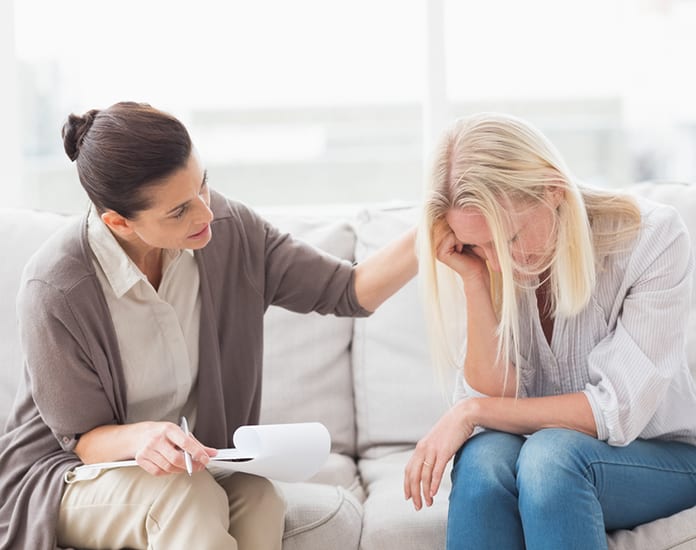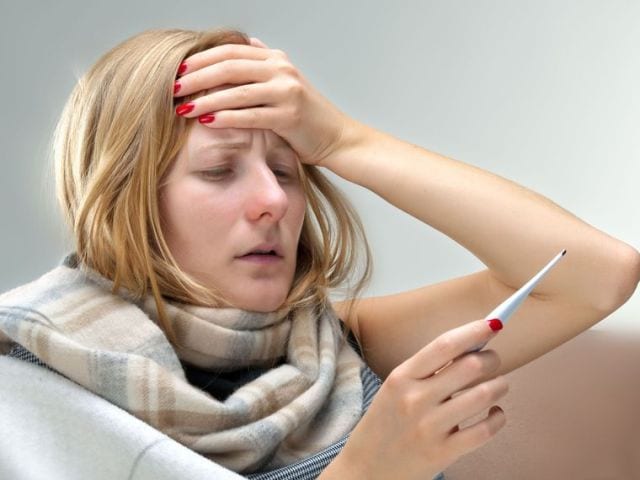
Menopause is a natural biological process marking the end of a woman’s reproductive years (in their late 40s or early 50s). But does menopause cause anxiety? While it is often associated with a variety of physical symptoms, such as hot flashes, night sweats, and changes in menstruation, what’s less commonly discussed is its potential impact on mental health.
Emerging research suggests that menopause can indeed cause anxiety and other emotional challenges for many women. In this article, we will delve into the complex relationship between menopause and anxiety, exploring the hormonal changes that underlie this connection, the various ways in which anxiety may manifest during this phase of life, and strategies for managing and alleviating these symptoms to help women navigate this transformative period with greater ease and well-being.
The experience of menopause is highly individual, and while not every woman will face anxiety as a direct consequence, it is essential to understand the potential mental health implications that may arise. With this article, we will shed light on this aspect of menopause, we aim to empower women with knowledge, dispel any stigmas or misconceptions, and provide guidance on how to maintain emotional equilibrium during this profound life transition. These anxiety symptoms come and go at different stages of their lives.
Contents
Does Menopause cause Anxiety?
Menopause can cause anxiety, as hormonal changes during this phase can affect mental health, leading to symptoms such as anxiety, stress, and even depression. Some women may also experience increased irritability and anger as part of menopausal symptoms.
Anxiety during menopause leaves you stressed, fearful, or tense. Moreover, this anxiety can cause physical symptoms, like palpitations, and can make symptoms like hot flashes worse.
Menopause anxiety is different for every single woman. For some women, it lasts a short while, maybe a few months. For other women, it can stay until all our symptoms settle.
The reasons for menopause anxiety are hormone changes, life stresses, and sleep problems. These major changes may all cause anxiety at this time.
The good thing is that the anxiety emanating from menopause typically resolves over time. For some people, however, those whose symptoms are significant enough to require treatment. The treatment is through medication or other interventions that won’t necessarily have to continue long-term, potentially just through this time period
What causes anxiety in menopause?
Anxiety during menopause can be attributed to a range of factors, making it a complex and multifaceted issue. Here’s a breakdown of the common causes:
- Hormone Changes: One of the primary drivers of anxiety during menopause is the significant hormonal fluctuations, particularly in estrogen and progesterone. These hormones play a crucial role in regulating mood, and their imbalance can affect neurotransmitter levels in the brain, potentially leading to heightened anxiety and mood swings.
- Physical Symptoms of Menopause: Menopausal symptoms, such as hot flashes, night sweats, body aches, and skin irritation, can be physically uncomfortable and distressing. These symptoms may disrupt daily life, impair sleep quality, and contribute to chronic stress, which in turn can trigger or exacerbate anxiety.
- Sleep Disturbances: Menopausal women often experience sleep disturbances, including night sweats and insomnia. The lack of restful sleep can lead to fatigue, irritability, and cognitive difficulties, all of which can heighten anxiety levels.
- Life Stresses: Menopause typically occurs during a stage of life when women may be juggling multiple responsibilities, including work, family, and caregiving. Life stresses and the demands of these roles can coincide with the challenges of menopause, leading to increased stress and anxiety.
- Psychological Factors: The transition through menopause can trigger existential and psychological concerns. For some women, it signifies the end of their reproductive years and may lead to a reevaluation of their life’s purpose, which can induce anxiety.
- Genetic and Environmental Factors: A woman’s genetic predisposition and environmental factors can also influence her susceptibility to anxiety during menopause. Some individuals may have a family history of anxiety disorders, making them more prone to experiencing anxiety during this phase.
- Hormone Replacement Therapy (HRT): Interestingly, the use of hormone replacement therapy to manage menopausal symptoms can sometimes lead to mood swings, anxiety, and even depression in certain women.
- Societal and Cultural Influences: Societal perceptions and cultural stigmas around menopause can also impact a woman’s mental health. Negative stereotypes and a lack of open dialogue may exacerbate anxiety in women going through this life transition.
Understanding these various causes of anxiety during menopause is essential for both women experiencing this phase and healthcare professionals. Tailored approaches to address these causes, such as hormonal therapy, lifestyle modifications, and psychological support, can help alleviate anxiety and improve overall quality of life.
Hormones and the brain

Estrogen is important for the growth and development of the brain in both men and women. It also plays a key role in many functions, including memory and mood.
Low estrogen levels during menopause can lead to cognitive decline, memory loss, and an increased risk of dementia. Lower estrogen levels may be one of the reasons why many women experience anxiety and mood swings in this time as well as why some experience insomnia.
The brain is also highly sensitive to fluctuations in neurotransmitter levels. When estrogen levels drop, another neurotransmitter called serotonin is also affected. Lack of serotonin is linked to mood disorders like depression and anxiety.
Social pressures
Women tend to get anxious about many things during menopause, from their health to their sex lives. Women are socialized to feel anxiety about these things, too, so it’s a two-way street. Women can also exacerbate their anxieties by worrying about them, which won’t help!
Women are also socialized to think about their health in a much different way than men. We’re taught to avoid lifting heavy objects, to watch what we eat and drink, to see a doctor if we’re sick, and to see a therapist if we have any issues with our mental health.
These are sometimes things that we have to do to stay healthy and alive, but they can be barriers to overall health and well-being, which can worry and stress out women.
Environmental factors
As you get older, you’re more likely to experience falls due to poor balance and vision problems due to macular degeneration, which can all cause anxiety.
Changes in your social life and your work life can also contribute to anxiety. You might have a friend who’s sick and you don’t want to pick up their slack at work, or you might have to start working full-time and feel overwhelmed.
These are normal anxieties that come from the changes that come with life. You shouldn’t avoid these anxieties or try to “resist” them—you can just learn how to better cope with them so that you don’t get so overwhelmed.
Let’s talk about medication

For anxiety during menopause, the normal anxiety treatment can work to markedly reduce anxiety and improve the quality of life. The common treatment methods for anxiety include antidepressants, psychotherapy including CBT, and supplements for a better mood.
Moreover, for challenges with hormones, you can treat that by using hormones and hormone therapy. This helps regulate your estrogen level and thus reduce anxiety.
Medications prescribed for other conditions often have a role in people who experience severe anxiety. For example, people with depression often take medication to regulate their mood. If a person with anxiety has also been diagnosed with clinical depression, medication for both conditions may be recommended.
There are also medications available that specifically treat anxiety, like benzodiazepines (like Xanax and Ativan), selective serotonin reuptake inhibitors, or SSRIs (like Paxil, Prozac, Zoloft, and Wellbutrin) and/or other antidepressants (like Celexa, Lexapro, and Zoloft).
Does anxiety from menopause go away?
Yes, most women find that their level of anxiety reduces once menopause passes. If you’re feeling more relaxed, that’s awesome! But the reality is that anxiety is rarely “just in your head.” It’s an emotion that can be traced back to the way you feel about yourself and the world around you.
It’s important to remember that anxiety is a condition that affects your brain chemistry as much as it does your behavior. This means that some aspects of it, like how you feel about yourself and how you perceive the world, are affected by external factors, like your hormones, your social life, your level of stress, and your sleep habits.
Can menopause cause severe anxiety?
If you’re experiencing severe anxiety and mood swings during menopause, it could be due to a combination of factors. It’s important to rule out other reasons for your anxiety before you focus on hormone changes and menopause.
The main cause of anxiety during menopause is hormonal changes. This can cause serious changes in the way you feel and live. Estrogen is a very important hormone in women. It influences the way your body looks, how you feel and how you control your emotions/ pain and others.
The other cause is sleep problems. Sleep problems are associated with reduced estrogen production and worries about your body and image. The worries about body image can lead to anxiety disorders too. Decreases in estrogen levels can change your body image and this can lead to anxiety.
Other people are worried about infertility and aging which can cause mood swings and anxiety. Moreover, it can lead to stress which brings a cycle of anxiety and stress.
Severe anxiety during menopause could be related to your social life, your level of stress, your worries about your body image and infertility, your sleep habits, or your diet.
Does low estrogen cause anxiety?
Yes, a Lack of estrogen may increase the chance in the development of anxiety and mood changes.
Estrogen is a popular culprit when it comes to menopause-related mental health issues, but what exactly is estrogen?
Estrogen is a chemical produced by both men and women to help maintain reproductive health, including stimulating libido and improving mood. It’s also found in a number of foods, like soy and meat.
But estrogen is not just present in women during puberty; it’s also present in men, and it’s present in both men and women throughout life.
There are a number of reasons why low estrogen may cause anxiety, though.
Can taking progesterone help with anxiety?
Progesterone acts as a natural antidepressant, enhances mood and relieves anxiety by stimulating the brain’s GABA receptors. GABA is a neurotransmitter that is primarily responsible for regulating feelings of anxiety.
Low GABA levels are linked to anxiety, while high levels are linked to feelings of calm. Interestingly, progesterone also acts as a precursor to estrogen, which increases estrogen receptors, increasing feelings of calm even further.
This means that, when taken during perimenopause and menopause, progesterone helps with anxiety by boosting GABA, and by increasing estrogen receptors, giving you a sense of calm.
Does lack of progesterone cause anxiety?
This is related to the above, as it may have caused by low progesterone levels. Low GABA is linked to anxiety as well as feeling anhedonic, which refers to a loss of interest in things you used to enjoy. When you have anhedonia, you may feel unmotivated and have trouble enjoying other aspects of life.
Anhedonia is almost like a “low energy” feeling, like you don’t have the “up” to put into other parts of your life. You may feel irritable, lethargic, depressed, and have trouble concentrating.
What does menopause anxiety feel like?
Feelings of anticipation, dread, or fear. Anxiety can be so intense that you experience a rush of emotions, such as excitement, dread, or anxiety. You may also feel an overwhelming sense of relief when the symptoms subside.
Can anxiety be a chemical imbalance?
Yes. Severe or long-lasting stress can change the chemical balance that controls your mood. This can lead to changes in your serotonin, dopamine, and norepinephrine levels, which are all linked to mood.
Studies have also shown that taking progesterone can help balance these levels by increasing serotonin production and by helping with anxiety.
Bottom line
It’s important to remember that anxiety is a condition that affects your brain chemistry as much as it does your behavior. This means that some aspects of it, like how you feel about yourself and how you perceive the world, are affected by external factors, like your hormones, your social life, your level of stress, and your sleep habits.
It’s also important to remember that anxiety is treatable. If you’re having a hard time coping with your anxiety, or if it’s causing you significant distress, it’s time to reach out for help. Treatment options like medication, psychotherapy, or support groups can make a big difference in your ability to cope.
FAQs
Is anxiety common in perimenopause?
Yes. This is a relatively new area of research, and there isn’t a lot of data yet. However, it is known that anxiety often goes hand in hand with mood disorders, such as depression, and is often a precursor to those.
What does perimenopause anxiety feel like?
Sad, or sluggish, or irritable. Some women experience a drop in libido (sex drive) and a decrease in energy and endurance during perimenopause. This change in hormones can make you feel sad, lethargic, or irritable.
Does perimenopause anxiety go away?
Yes. Symptoms may go away when perimenopause ends. However, postmenopausal women (women over 50) are the most likely to experience anxiety. This is because you get a hormonal balance when the period is over thus improving mood and reducing stress.